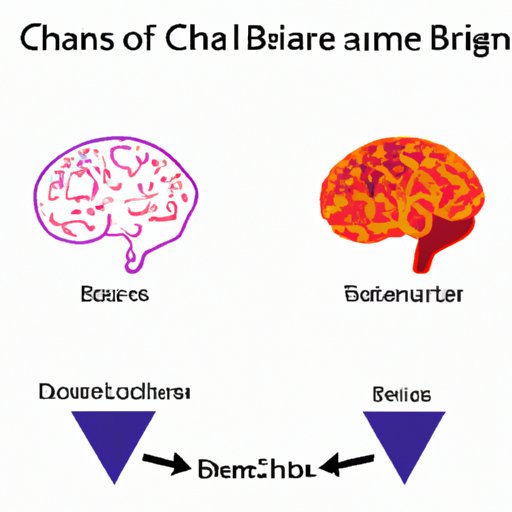
Introduction
Have you or someone you know been diagnosed with Chronic Small Vessel Ischemic Disease of the Brain? While this condition sounds frightening, it is not uncommon, and there are ways to manage and treat the symptoms associated with it. Understanding this disease and its effects on the brain is critical to promoting overall health and well-being. In this article, we will explore Chronic Small Vessel Ischemic Disease in detail, including its symptoms, risk factors, and prevention.
Understanding Chronic Small Vessel Ischemic Disease of the Brain: Symptoms and Risk Factors
Chronic Small Vessel Ischemic Disease of the Brain is caused by changes to the small blood vessels in the brain. These changes can lead to a reduced blood supply to the brain’s white matter, causing damage over time. Common symptoms of the disease include difficulty with memory, mood changes, and trouble with balance or coordination.
Risk factors associated with Chronic Small Vessel Ischemic Disease of the Brain may include hypertension, diabetes, high cholesterol, smoking, and a family history of the disease. The risk of developing this condition increases as we age, and it is more common in women than men.

Brain Changes: Chronic Small Vessel Ischemic Disease and Its Impact on Your Health
When Chronic Small Vessel Ischemic Disease affects blood supply to the brain, it can cause damage to neurological functions, including the ability to think, feel, and coordinate movements. The negative impact on overall health and well-being can include cognitive decline, falls, and even full-blown dementia. Early detection of this disease is critical to manage potential cognitive loss.
The Link Between Chronic Small Vessel Ischemic Disease and Dementia
Studies have shown that individuals with Chronic Small Vessel Ischemic Disease are at higher risk of developing dementia. Those with the disease have an increased risk of developing memory loss and may struggle to manage daily activities. However, prevention and management strategies, such as regular physical exercise, a healthy diet, and prescribed medication, can help reduce the risk of developing dementia.
Preventing Chronic Small Vessel Ischemic Disease: Lifestyle Changes You Need to Adopt Today
Lifestyle changes are critical to reduce the risk of developing Chronic Small Vessel Ischemic Disease. Incorporating healthy habits into your daily routine can help maintain good brain health. A few effective strategies to reduce the risk of developing this disease include regular physical exercise, a healthy diet, limiting alcohol and cigarette use, and getting quality rest and sleep daily.
The Importance of Early Diagnosis and Treatment of Chronic Small Vessel Ischemic Disease
Early detection is crucial for reducing the negative consequences of Chronic Small Vessel Ischemic Disease. Treatment options may include medication, dietary changes, and physical therapy. Every individual may have a unique way of responding to treatment, which is why it’s essential to work closely with your doctor for early diagnosis and treatment.
How Chronic Small Vessel Ischemic Disease Affects Your Cognitive Functions
Chronic Small Vessel Ischemic Disease can affect cognitive functions like memory, decision-making abilities, and motor coordination. Taking steps to maintain cognitive health can help prevent or reduce the severity of cognitive losses associated with the disease. Habits such as exercising, staying mentally engaged, prioritizing sleep, and managing stress can help maintain good brain function.
Debunking Myths About Chronic Small Vessel Ischemic Disease of the Brain
There are many misconceptions about Chronic Small Vessel Ischemic Disease of the Brain that can lead to anxiety or delay in seeking medical attention. One common myth is that the disease only affects the elderly or that it is inevitable. However, anyone can get diagnosed with this condition, and there are tools and resources to help manage and prevent the disease.
Conclusion
In summary, Chronic Small Vessel Ischemic Disease is a neurological condition that affects the small blood vessels in the brain, leading to cognitive impairment and other symptoms. While this disease can be challenging to manage, lifestyle changes and treatments can reduce the overall impact of the disease. If you or a loved one is experiencing any signs or symptoms of Chronic Small Vessel Ischemic Disease of the Brain, speak to your healthcare provider for a proper diagnosis and treatment plan.




